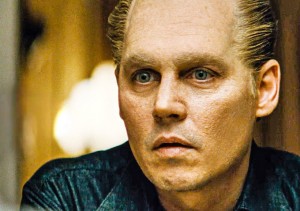Black Mass
Black Mass, 2015, 3 ½ stars
Mass appeal
Though conventional, Black Mass should be a crowd-pleaser
Exclusive to MeierMovies, September 16, 2015
Johnny Depp and Salvador Dali have something in common. No, it’s not their shared penchant for the surreal. It’s their typecasting.
To casual art lovers, Dali represents only the bizarre, the abstract. Few realize that for every Persistence of Memory and The Great Masturbator, there was The Discovery of America by Christopher Columbus and Leda Atomica, the latter two proving the painter could conquer slightly more classical subjects and styles.
Depp, too, has been misjudged in recent years. Though that’s partly his own fault thanks to his offbeat roles and love of crazy costumes and characterizations, that makes him no less a dramatic actor. So if you’ve forgotten his turns in Chocolat and Finding Neverland, there’s now Black Mass, the new film by director Scott Cooper (Crazy Heart, Austin Power: The Spy Who Shagged Me), which proves again that Depp is one of the most consistently interesting actors of his generation.
With that affirmation of Depp out of the way, let me say that Black Mass is not just about James “Whitey” Bulger, the notorious South Boston gang leader. In fact, we learn little about Bulger’s motivations or early life. And Depp’s portrayal, though mesmerizing and a tad creepy thanks to the blue contacts – hey, you have to allow him some physical quirk, right? – never gets to the heart of the man, if he has a heart. Instead, Black Mass is content to be a sort of “film by numbers,”reciting the details of Bulger’s collaboration with the FBI during the 1970s and ‘80s, leading to the corrupt cooperation being exposed in the mid-1990s (the facts of which get slightly muddled and condensed in the film).
The movie belongs to Joel Edgerton (as John Connolly, the main FBI collaborator) just as much as Depp, and he handles the responsibility well. As with some of the other actors, his South Boston dialect isn’t entirely consistent and drifts toward Brooklyn on occasion. But all the principals pass the true test of an accent or dialect, by never letting it get in the way. (Interestingly enough, true Southie speakers often show inconsistencies too, especially in their rhoticity, or lack thereof.)
As Bulger’s brother (Massachusetts State Senator Billy Bulger), Benedict Cumberbatch is solid, as are several members of Bulger’s Winter Hill gang, who look like they just strolled in off a Southie street. Kevin Bacon as an FBI guy is a decent addition, and Peter Sarsgaard, as a low-life associate of Bulger, steals every scene he’s in. They all project the requisite coarseness and brutality, and the film’s violence, though graphic, rarely seems gratuitous. This is the culture of “if no one sees it, it didn’t happen.” It’s the culture that allows you to whack someone in the late afternoon, take a peaceful nap and still make family dinner on time.
The storytelling is mostly clear and concise, and even occasionally gripping, despite the slow pace. In addition, the main story is framed nicely by the post-arrest confessions of several gang members. But the film offers few surprises. It’s also a tad cold, reaching emotional depth only when Bulger’s young son falls ill from a freakish and sudden diagnosis of Reye Syndrome. But the screenplay (written by Mark Mallouk and Jez Butterworth and based on a book by Dick Lehr and Gerald O’Neill) is fascinating enough and the film structurally sound enough to succeed. And even if Depp doesn’t deliver the Oscar performance some had hoped for, he still captures much of the ruthlessness and depravity of a man the FBI ironically described as a “smart, stable motherfucker.”
© 2015 MeierMovies, LLC
